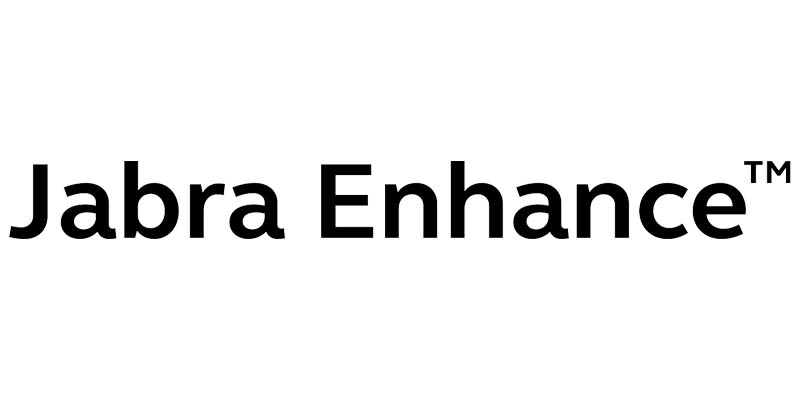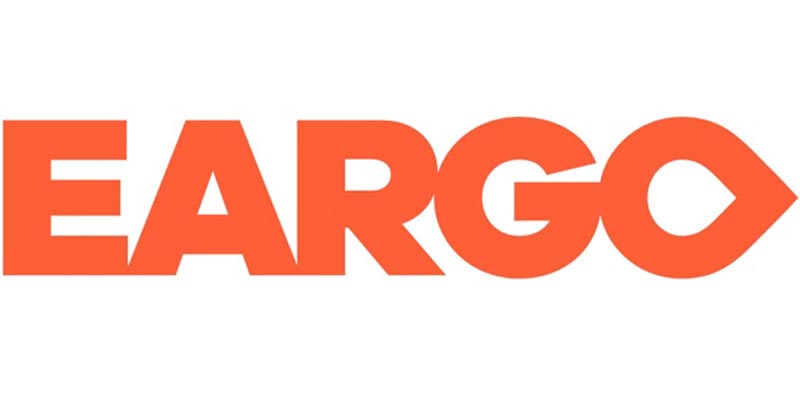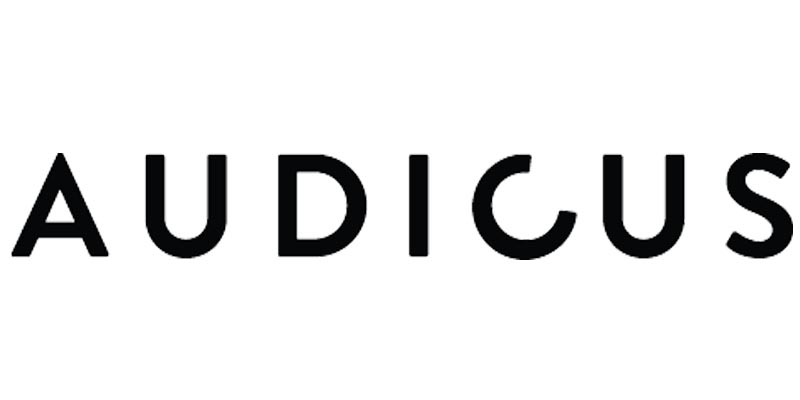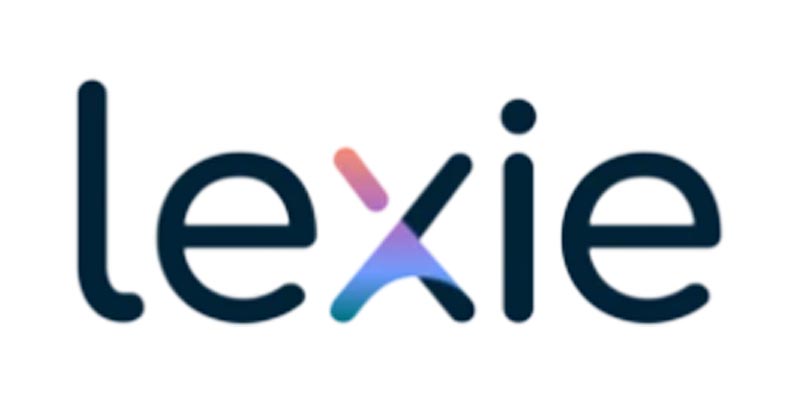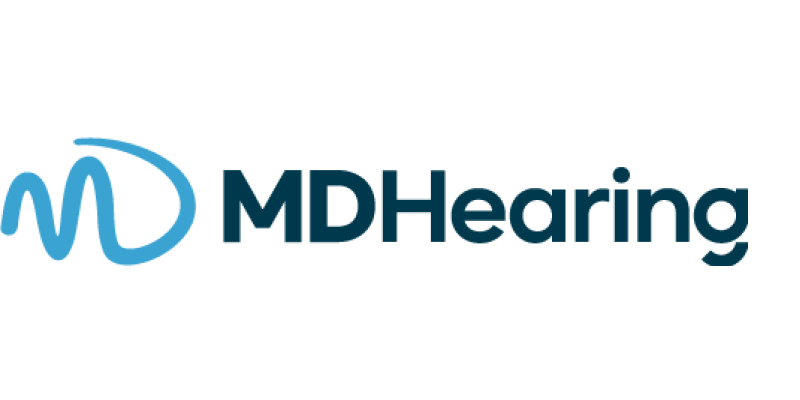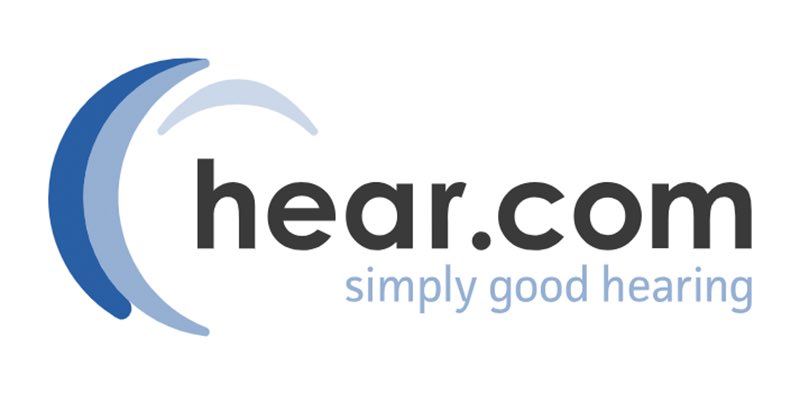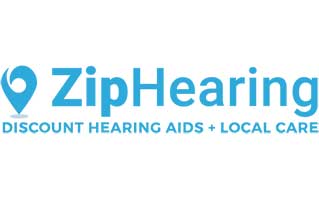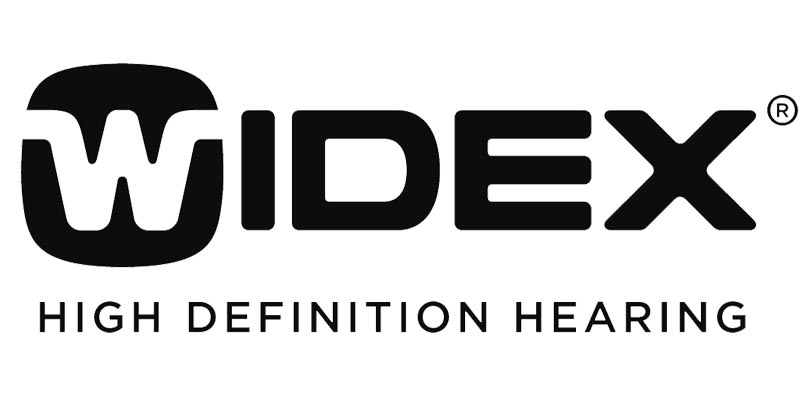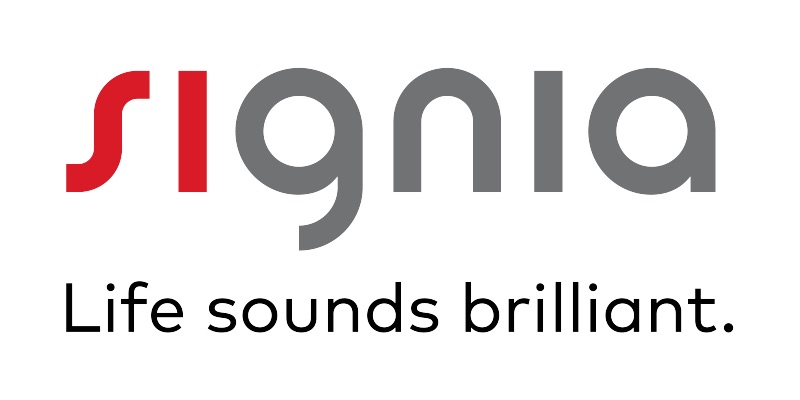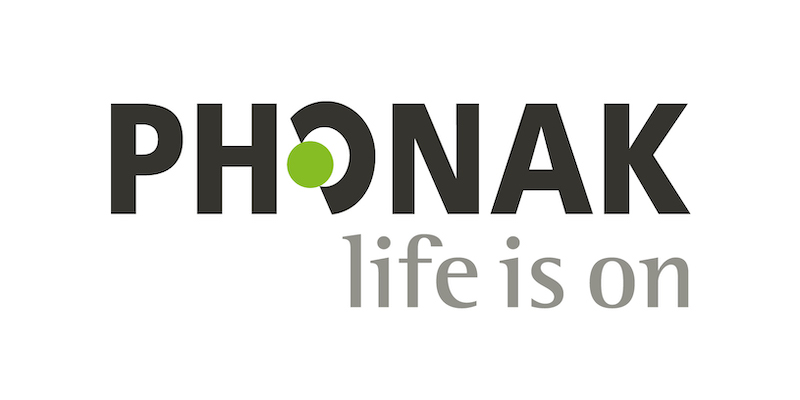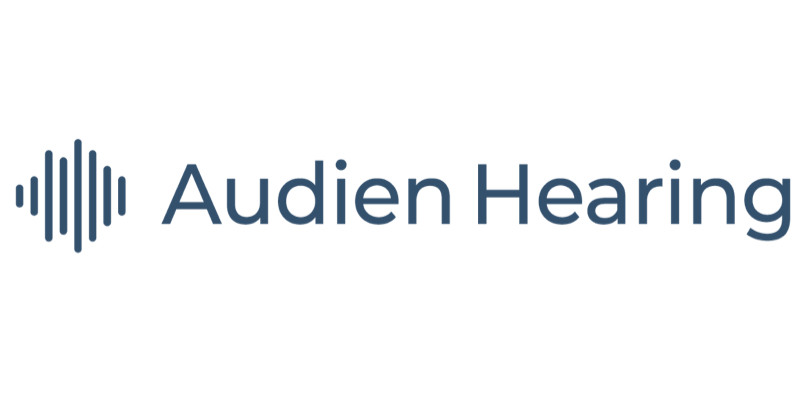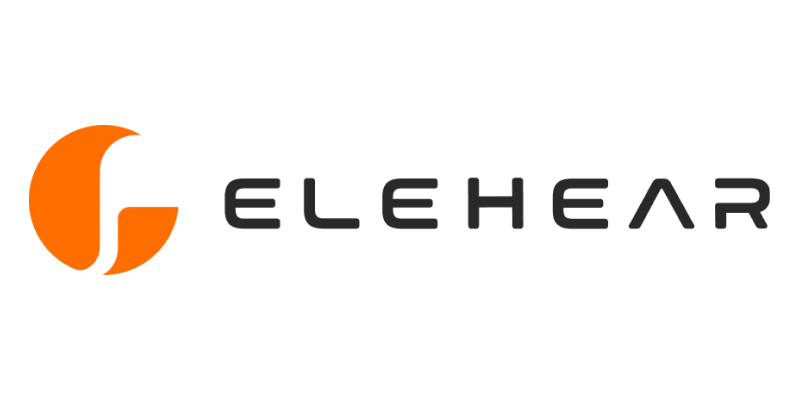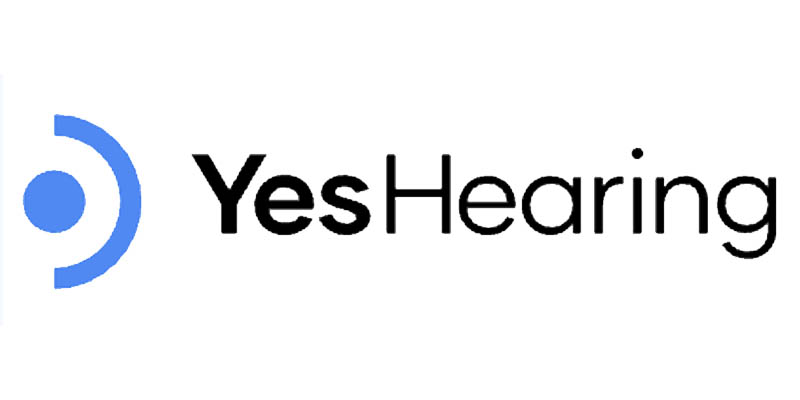Best Hearing Aid Companies
Updated:
Retirement Living takes an unbiased approach to our reviews. We may earn money when you click a partner link. Learn More
We evaluated 32 well-known hearing aid brands, performed long-term testing on devices, and consulted audiologists to help identify the most important factors to consider when evaluating a device’s effectiveness at combating hearing loss. Here are the best hearing aid companies for 2024 based on our in-depth research.
- Great Virtual Support
- Online hearing test
- 100-day free trial
Jabra Enhance hearing online tools start with a virtual consultation to determine the type of hearing aid you need. After receiving them, the company provides support as needed. Jabra Enhance is an excellent option for customers who need affordable hearing aids without visiting an office.
- Innovative Products
- Expedited process
- 4 hearing aid models available
Eargo hearing aids treat mild to moderate hearing loss. Consumers can buy breathable, rechargeable hearing aids online with no hearing test or prescription. Eargo provides unlimited phone support from licensed hearing professionals.
- Great Subscription Plan
- Bluetooth, rechargeable & remote models available
- Get new model every 18 months
Audicus offers high-quality, affordable hearing aids online. The company has been helping consumers find versatile, discreet hearing aids since 2011. Monthly pricing options are available.
- Great Technology
- 45-day free trial
- Affordable subscription available
Lexie Hearing aids offer cutting-edge technology with low prices and easy access to customer service. The company sells directly to consumers at a lower cost with the option of Lexie Hearing subscription payment plans.
- Great Value Hearing Aid
- Smart and rechargeable options
- Free lifetime support
MDHearing is a Midwestern hearing aid company that creates affordable hearing solutions. The state-of-the-art devices are rechargeable (up to 20 hours fully charged), smartphone compatible, and have advanced feedback cancelation technology.
- Great Service and Value
- Custom programmed by Embrace Audiologists
- Free online hearing test
Upload your hearing test to Embrace Hearing to get customized hearing aids with two-way integrated Bluetooth. Embrace Hearing’s online Hearing Aid Comparator lets you compare prices, warranties and more across approximately 30 hearing aid models.
- Great Selection
- 2,000 licensed providers
- 45 day no-risk trial
Hear.com offers a broad range of hearing aids that pack cutting-edge technology into compact designs. A team of hearing care specialists guide customers through choosing the right hearing aid.
- Great Online Store
- Comprehensive online product selection
- Local hearing aid service
ZipHearing offers discounts on multiple hearing aids, personal hearing aid fitting and adjustments and a 45-day trial period. Check out their website to compare hearing aid prices and view fitting options.
- Great Natural Sound
- Noise suppression for enhanced clarity
- No-obligation trial offer
Widex hearing aids offer unrivaled high-definition sound in complex sound environments. Widex PureSound and ZeroDelay technologies reduce distortion, and the SmartRIC features an L-shaped design that improves microphone angles for better sound clarity.
- Great Mobile Apps
- Hearing aids for mild to profound hearing loss
- Seven models to choose from
Signia Assistant artificial intelligence and TeleCare support ensure your hearing aids work well in all environments. The company sells hearing aids for active individuals, discreet wear, elegant style and more.
- Broad Product Line
- Patented Paradise sound technology
- Models for all types of hearing loss
Phonak is an award-winning leader in hearing aid technology. The company offers several hearing devices and accessories to provide the right fit. Phonak Paradise technology produces crisp natural sound and adjusts to your environment.
- Great Affordable Option
- Wireless charging
- Easy setup process
With prices starting at $99, Audien Hearing devices are a great option for seniors on a budget. Audien offers two hearing amplifiers, two ITC hearing aids, and one advanced BTE hearing aid. The Audien Hearing Atom is 26% smaller than the EV1 and features a wireless charging dock. Use code “RETIRE12” for 12% off your purchase.
- Great Battery Life
- In-app adjustments
- AI noise reduction
ELEHEAR hearing aids are rechargable, lightweight, and discreet for a BTE model. They are easy to program, and you can quickly adjust them according to your surroundings using a button or via the app.
- Innovative Products
- Various styles of hearing aids
- Mobile application
Oticon is a technological innovator, and the company’s high-quality products – though expensive – are considered to be top quality.
- Great In-Home Care
- 45-day money back guarantee
- Phonak, Oticon, Starkey, Signia, and ReSound
Fully licensed virtual hearing aid retailer offering the top hearing aid brands at 40% off retail price. Start with a free consultation, then access in-home care from specialists to help program, fit, and adjust your device. Hearing aids available for all types of hearing loss.
We started with an evaluation of 32 well-known hearing aid brands. We considered costs, features, hearing aid model selection, consumer reviews and expert data. Our search ended with the best hearing aid companies: Eargo, Jabra Enhance, Lexie Hearing, Audicus, MDHearing, Embrace Hearing, Hear.com, ZipHearing, Audien, ELEHEAR, Widex, Signia, Phonak Hearing Aids, Oticon, and Starkey Hearing Aids.
Read our methodology for testing hearing aids to learn more about our experience wearing the devices.
Best Hearing Aid Company Reviews
Eargo Hearing Aids Review
Innovative Products |
Eargo sells affordable and attractive in-canal hearing aids without a prescription. Eargo hearing aids are designed for mild to moderate hearing loss with tips that create a breathable fit. Customers receive lifetime phone support from licensed hearing professionals. You can also try before you buy—order a free, non-working sample to test the fit delivered to your home.
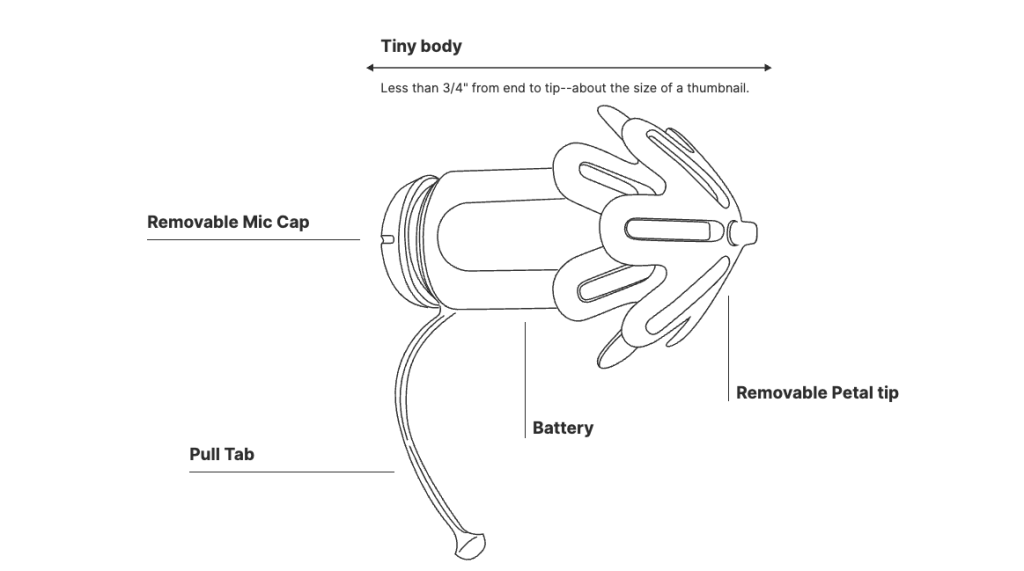
All Eargo hearing aids come with a manufacturer’s warranty and a 45-day return period. After you purchase an Eargo device, you’ll work with a personal hearing professional to help you program the device, and you’ll have customer support forever.
- Cost per pair: $1,650 – $2,950
- Type: CIC
- OTC or Prescription: Over-the-counter
- Technology: Rechargeable, Bluetooth
- Adjustment: Via the app, tapping on the ear, remote programming support
- Warranty and trial period: 1 year (Eargo 5 and Eargo 6); 2 years (Eargo 7); 45-day trial
- Financing: As low as $47 per month
Eargo devices are small and comfortable, yet pack enough advanced technology to allow for a natural hearing experience with noise reduction, feedback cancellation, and smart adjustments. The newest Eargo 7 model allows you to automatically adjust the hearing aids’ sound profile to your surroundings.
To learn more, read our comprehensive Eargo hearing aids review.
Audicus Hearing Aids Review
Great Subscription Plan |
Audicus sells four over-the-counter hearing aids online, or you can visit one of its clinics in New York City, Chicago, Illinois, and Denver, Colorado. The RIC and CIC devices treat mild to severe hearing loss. Audicus has a unique rental program called the Audicus Plus Plan that lets members upgrade to newer models after renewing their contracts.
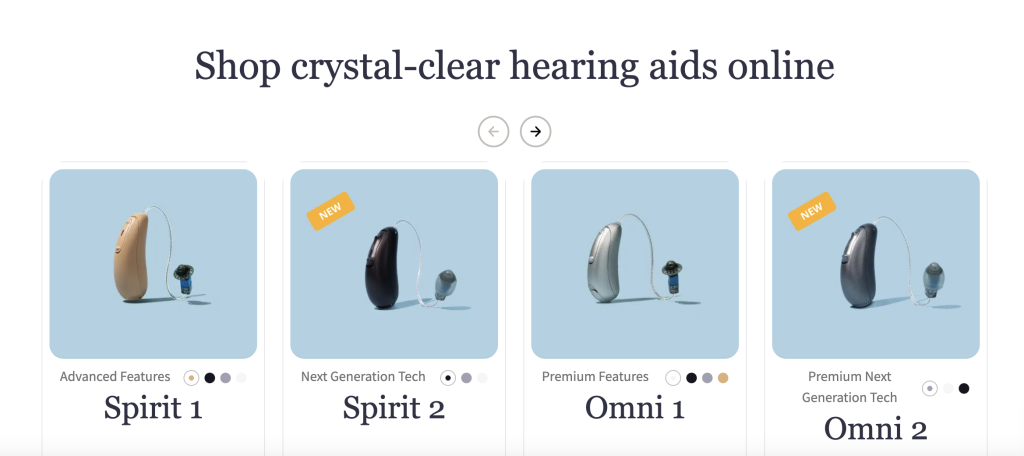
Take a hearing test online (Audicus hearing aids don’t require fitting), and an audiologist will customize your hearing aids depending on your needs. Remote setup, programming, and adjustments are available. Or you can adjust settings in the mobile app or via the buttons on the device.
- Cost per pair: $1,398 – $2,798
- Type: CIC, RIC
- OTC or Prescription: Over-the-counter, in person
- Technology: Rechargeable, Bluetooth, digital noise reduction, partner mic
- Adjustment: Via the app, tapping on the ear, remote programming support
- Warranty and trial period: 2- or 3-year warranty; 45-day risk-free trial
- Financing: $100 per month
Audicus provides a 45-day trial period. Costs start at $1,398, which is a more affordable option than some competitors, but additional features like rechargeable batteries, care kits, remote controls for adjustments, and three-year warranty plans cost extra (between $36 and $198 each).
Read our full Audicus hearing aids review to learn more.
Jabra Enhance Hearing Aids Review
Great Virtual Support |
Buy Jabra Enhance hearing aids without a prescription from the direct-to-consumer website. Jabra Enhance offers low-cost behind-the-ear (BTE) hearing aids backed by GN, a global leader in the industry with 150 years of hearing expertise. You can choose from three device models that come in several colors to match your complexion or hair color, and they are suitable for those with mild to severe hearing loss.
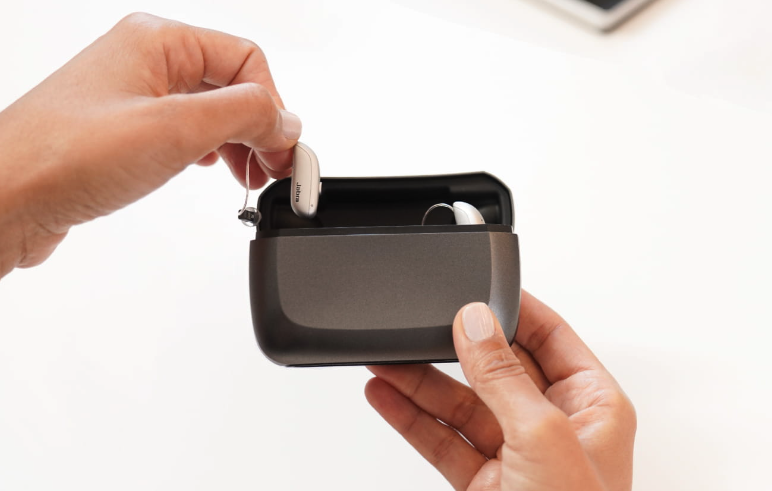
- Cost per pair: $1,195 – $1,995
- Type: RIC, ITE
- OTC or Prescription: Over-the-counter
- Technology: Rechargeable, Bluetooth
- Adjustment: Via the app, tapping on the ear, remote programming support
- Warranty and trial period: 1- or 3-year warranty, including loss and damage protection; 100-day trial
- Financing: As low as $39 per month
Choose a battery-powered (Enhance Select 50) or rechargeable hearing aid. The rechargeable charging case will power 30 hours of sound per three-hour charge. Jabra Enhance offers a 100-day risk-free trial, the longest in the OTC industry, and a warranty between one and three years, depending on the support package you choose. We consider this to be Jabra’s stand-out feature.
Premium members get full access to Jabra Enhance’s trained audiology care team, who are there to offer comprehensive remote support—not every hearing aid company has an audiology care team on staff for consultations. The aids come with several processing channels and advanced noise-reducing technology. Adjust manually or through the app (the audiology care team will help you).
Learn about our experience taking Jabra Enhance’s online hearing test in our comprehensive Jabra Enhance review.
Lexie Hearing Aids Review
Great Technology |
Lexie’s self-fitting OTC hearing aids provide cutting-edge technology at low prices. They are suitable for mild to moderate hearing loss. Lexie also offers a unique monthly subscription payment plan that makes accessing hearing aids, parts, and maintenance more affordable. You can buy Lexie devices online and in stores where healthcare devices are sold, but the company only offers remote support (as do many others).
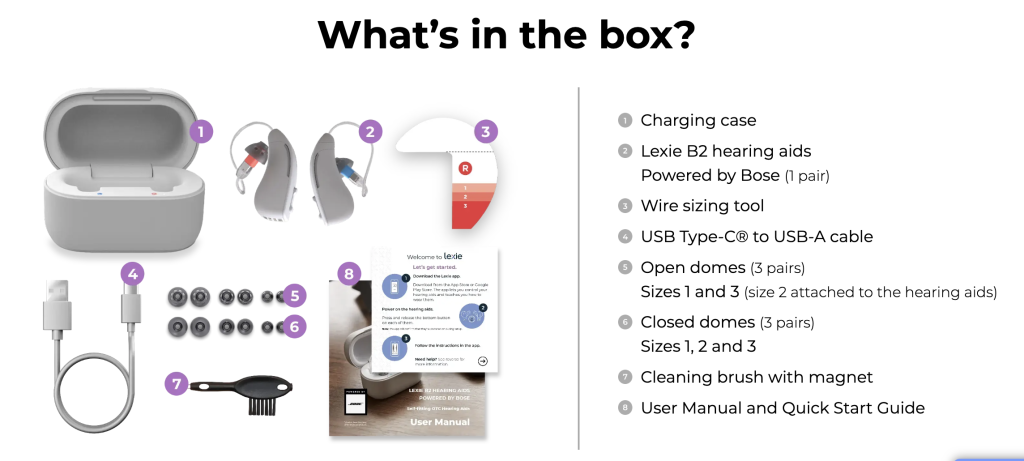
All Lexie hearing aids come with noise and feedback reduction to decrease background sounds and cut down on whistling. The Lexie B2 lets you stream phone calls on iPhones, but not Androids.
- Cost per pair: $799 – $999
- Type: RIC, BTE
- OTC or Prescription: Over-the-counter
- Technology: Rechargeable, Bluetooth, telecoil, noise reduction
- Adjustment: Via the app, remote programming support
- Warranty and trial period: 1-year warranty; 45-day free trial
- Financing: As low as $39 per month
Lexie Hearing’s mobile app can adjust your hearing aids, monitor battery power, and store your preferred settings for easier adjustments. This is a great feature for those comfortable with technology, but if you prefer to adjust your aids manually, we recommend considering other brands. The Lexie Luman is also a good choice for those who prefer simpler devices.
Read our comprehensive Lexie Hearing review to learn more.
MDHearing Review
Great Value |
MDHearing’s high-quality, medical-grade hearing aid models come with 24/7 customer service and licensed audiologists on staff who can answer any questions. The devices are a great money-saving option if you don’t need a custom fit, but MD Hearing’s greatest benefit is its versatile line of products at affordable prices.
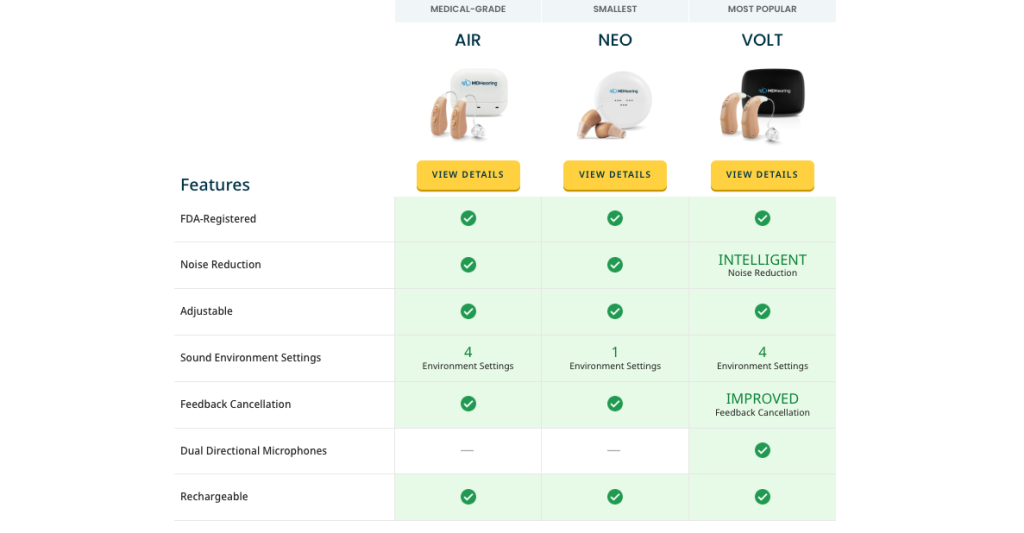
Its most affordable model, the AIR, has advanced noise reduction, rechargeable batteries, feedback cancellation, and telecoil technology. You can get dual directional microphones (which help filter out unwanted noise), intelligent noise reduction (for greater speech clarity), and Bluetooth capability at a slightly higher price point. These devices won’t work for severe hearing loss, but the products are FDA-registered and designed by doctors and audiologists.
- Cost per pair: $297 – $699
- Type: RIC, BTE
- OTC or Prescription: Over-the-counter
- Technology: Rechargeable; environmental settings, directional microphones, noise reduction, water resistance
- Adjustment: Tapping a button, turning a dial, 1:1 programming support (VIP care only)
- Warranty and trial period: 1-year warranty; 45-day free trial
- Financing: As low as $24.75 per month
MDHearing offers four devices ranging from about $800 to $1,900 for two hearing aids when not on sale. The company runs frequent sales, and single-device pricing is also available. It also offers 12-month 0% financing, a 45-day trial period, and a money-back guarantee. MDHearing manufactures the devices in the U.S. and sells directly to consumers to keep costs down.
For details, read our full MDHearing review.
Embrace Hearing Review
Great Service and Value |
Embrace Hearing offers two hearing aid designs, each featuring two models. All Embrace Hearing aids are custom programmed to the customer’s hearing test. The same audiologist who initially programs your hearing aids makes future adjustments.
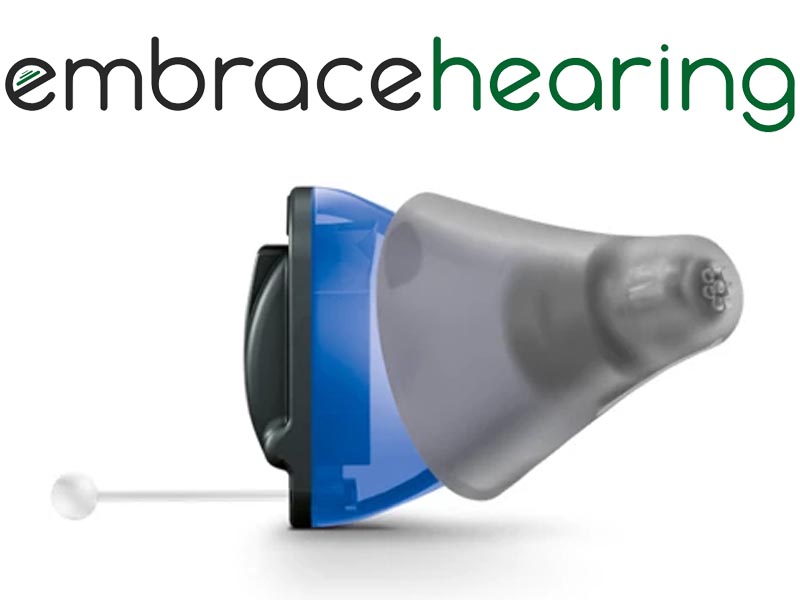
Embrace Hearing Aids
- The X-Series is a RIC design with Bluetooth for hands-free calls and TV streaming. Adjust the hearing aids with a button on the device, remote control or mobile app. Performs well at home and in small group settings.
- Embrace Hearing’s C-Series is a practically invisible ITC model that works well with glasses, masks and helmets. Use the mobile app or a small remote control to adjust the hearing aids. Works well in group meetings and large venues like theaters with background noise.
Customer service and support are available 24/7. You can consult with audiologists for help choosing the ideal hearing aids based on hearing test results. Embrace Hearing requires an audiograph generated from a professional hearing test to dispense your hearing aids.
Embrace Hearing aids cost from $899 to $2,498. Add $200 per ear for a rechargeable model with a telecoil. The hearing aids are produced by one of the world’s leading hearing aid manufacturers. Embrace Hearing offers a 45-day trial period, a three-year warranty and payment plans.
To learn more or start your 45-day trial, call 855-278-3108. Or read our full Embrace Hearing review.
Hear.com Review
Great Selection |
Hear.com sells medical-grade hearing aids from most of the industry’s top manufacturers. Answer a quick questionnaire online, and a hearing specialist will guide you through choosing the right hearing aid for your budget and level of hearing loss.
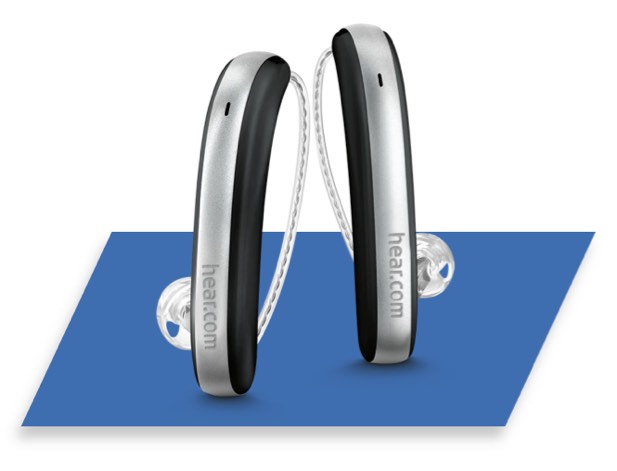
Hear.com Screenshot
The prescription hearing aid brands include:
- Oticon: Dscreet hearing aid design with smart technology.
- Phonak: Multi-microphone technology for clarity.
- ReSound: Mobile app that stores settings for future use.
- Widex: Fully digital hearing aids differentiate between 100 different sound scenarios.
- Signia: Waterproof hearing aids.
Because some of the products available at Hear.com are prescription devices, you’ll pay a higher price for medical-grade devices. However, you’ll also have access to hearing tests, customer support, aftercare, manufacturer’s warranties, and more. Costs on Hear.com range from $1,600 to $6,500 per pair, which includes a 45-day no-risk trial.
Read our comprehensive Hear.com review for more information.
ZipHearing Review
Great Discounts with Local Service |
As a marketplace, ZipHearing sells top prescription hearing aid brands online for up to 50% less than retail. Local, face-to-face care is included with all purchases, ensuring proper tunings and fittings, timely adjustments, and convenient follow-up care.
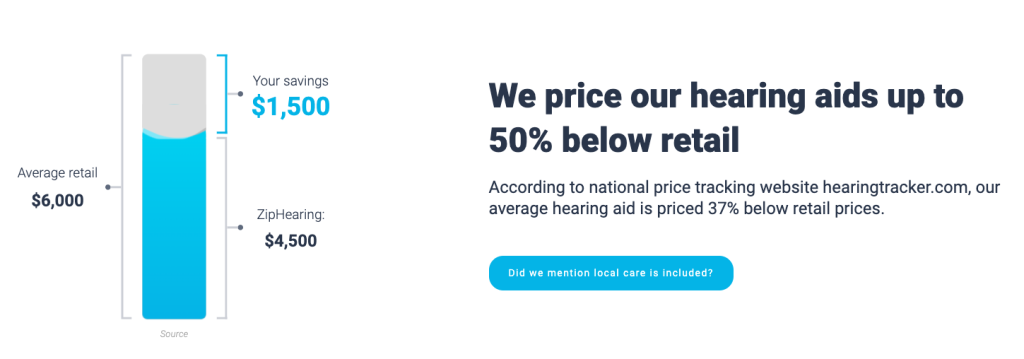
While mystery shopping ZipHearing’s website, we found the prices competitive and the shopping experience easy. Just browse its product listings, selecting various filters to sort and compare hearing aids by type, size, feature, price, or brand. You can quickly narrow your options and read consumer reviews. Most models show prices, although some require a chat or phone call for cost due to the various model options.
ZipHearing is an authorized seller of top brands like Phonak, Starkey, Signia, Resound and Widex. Visit one of 600 local audiology or hearing aid clinics for new batteries, adjustments and other services.
Customers report saving up to 50% on the cost of hearing aids. We found prices ranging from $1,988 up to $4,798 (per pair) for high-quality hearing aids. ZipHearing offers a 45-day risk-free trial.
To get started, call ZipHearing at 855-739-1910 or request a call back from this online form. You can also read our comprehensive ZipHearing review to learn more.
Widex Hearing Aids Review
Great Sound |
Widex offers high-quality hearing aids with precision tuning and rigorous testing. Dr. Michele Matyko praises Widex for its management of tinnitus symptoms; the PureSound and ZeroDelay technologies enhance hearing while reducing background noise and ringing. Widex hearing aids also help suppress wind noise, something to consider if you frequently travel or spend time outdoors.
The company offers several models that treat hearing loss that ranges from mild to profound. New in 2024, the SmartRIC pictured below features a new L-shaped design that places the microphone higher on your ear and at an angle tested to enhance your ability to hear in any sound environment. In this position, the microphones are horizontal, and the inlets reduce wind and touch noise more effectively.
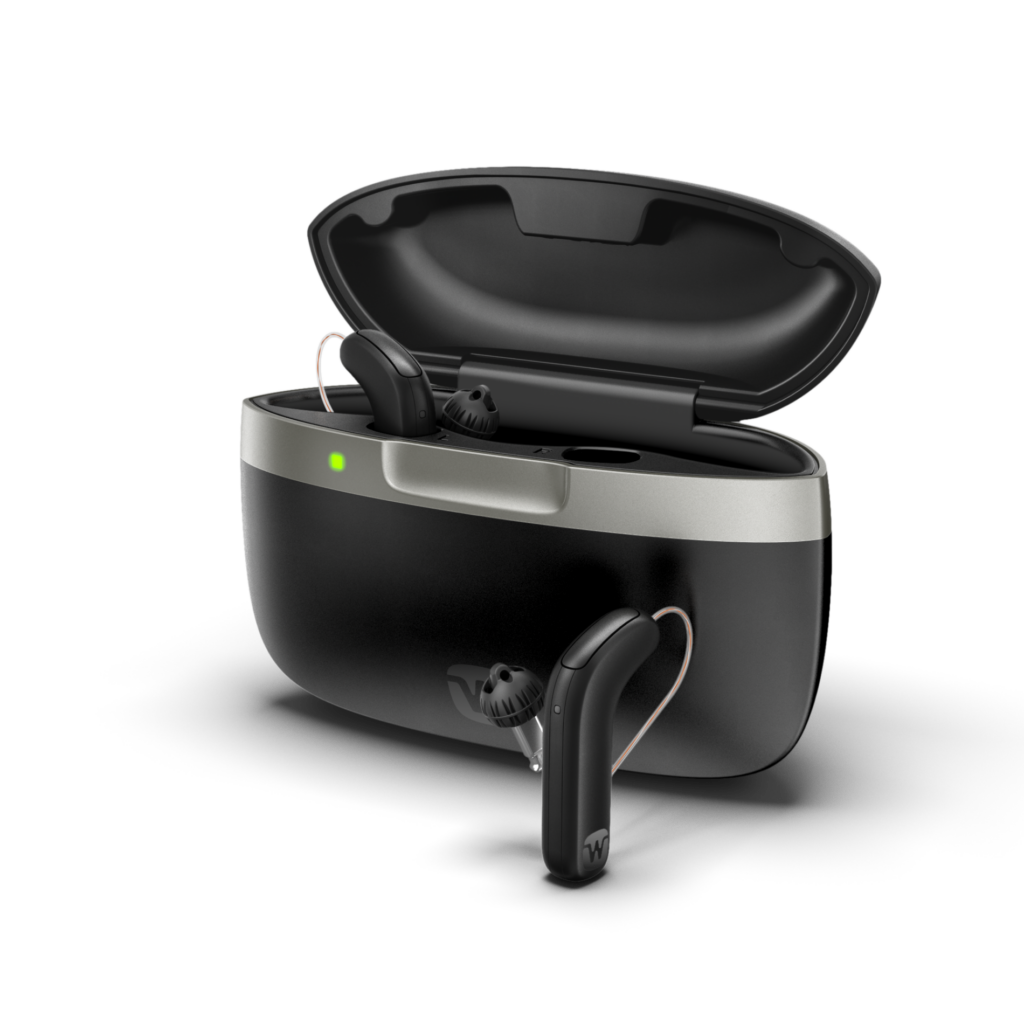
- Cost per pair: $3,600 – $7,200
- Type: BTE, CIC, RIC, ITE
- OTC or Prescription: Prescription
- Technology: Rechargeable; Bluetooth, tinnitus masking, directional microphones, sound therapy, water resistance
- Adjustment: Tapping a button, turning a dial, via the app, in person
- Warranty and trial period: Varies by retailer
- Financing: Varies by retailer
You can’t buy Widex hearing aids on its website. Instead, you’ll need to fill out an online form to have a local hearing care professional contact you. Widex’s prescription devices will be more expensive than those sold by OTC brands, but customers and experts recommend Widex for its advanced technology and wide range of features. Dr. Matyko also deems the Widex app the best of all the manufacturers’ apps because she finds the programming software user-friendly and one of the easiest to manage.
Widex does not publish prices on its website and notes that the costs for the same model will vary by provider. We found pricing from $1,875 to $3,600 per ear.
To learn more, read our comprehensive Widex hearing aids review.
Signia Hearing Aids Review
Great Mobile App |
Signia manufactures a selection of premium hearing aids for mild to profound hearing loss—one model even treats single-sided hearing loss. The company’s mobile app includes TeleCare, a direct contact to a remote hearing specialist for assistance. The app also allows you to adjust your hearing aids to your environment.
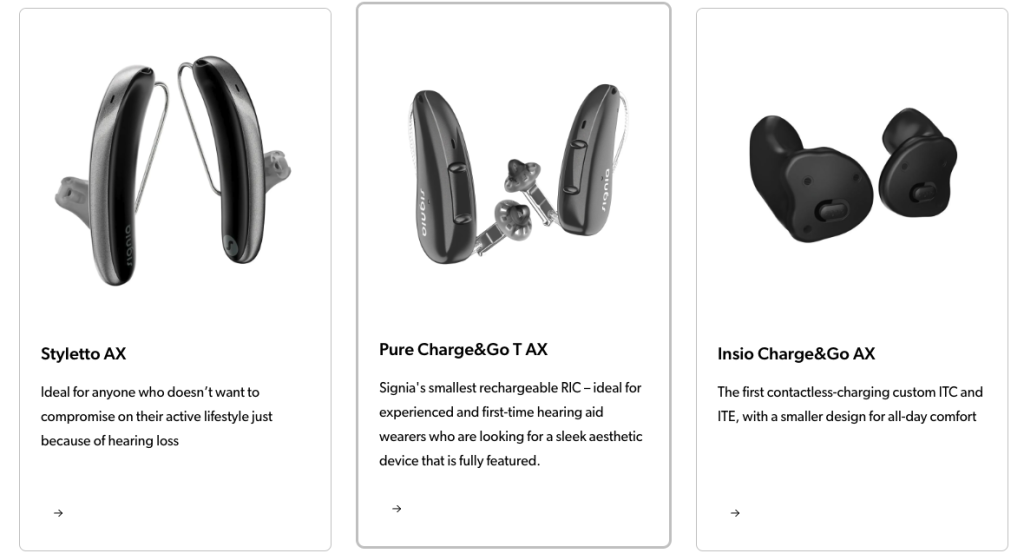
Signia devices stand out for their discreet and stylish designs and Own Voice Processing (OVP), which calibrates your hearing aids so you hear your own voice in a way that feels normal and natural. Most models help manage tinnitus and are rechargeable (including travel cases). The Signia Silk X addresses hearing loss in only one ear.
- Cost per pair: $1,540 – $5,945
- Type: CIC, RIC, ITC, BTE, ITE
- OTC or Prescription: Prescription
- Technology: Rechargeable; Bluetooth, tinnitus masking, telecoil, directional microphones, environmental settings, Own Voice Processing, water resistance
- Adjustment: Tapping a button, turning a dial, via the app, in person
- Warranty and trial period: Varies by retailer
- Financing: Varies by retailer
You must receive a professional evaluation at a hearing care clinic to purchase Signia hearing aids. While Signa can’t compete with OTC pricing, its costs are comparable to other prescription hearing aid retailers like Oticon and Phonak.
Read our full Signia hearing aids review for more information.
Phonak Hearing Aids Review
Broad Product Line |
Phonak manufactures hearing aids with universal Bluetooth compatibility and is the only hearing aid company to offer an invisible in-the-canal hearing aid that can be worn 24/7. The company prioritizes advanced technology features to increase hearing abilities in extremely challenging hearing environments.
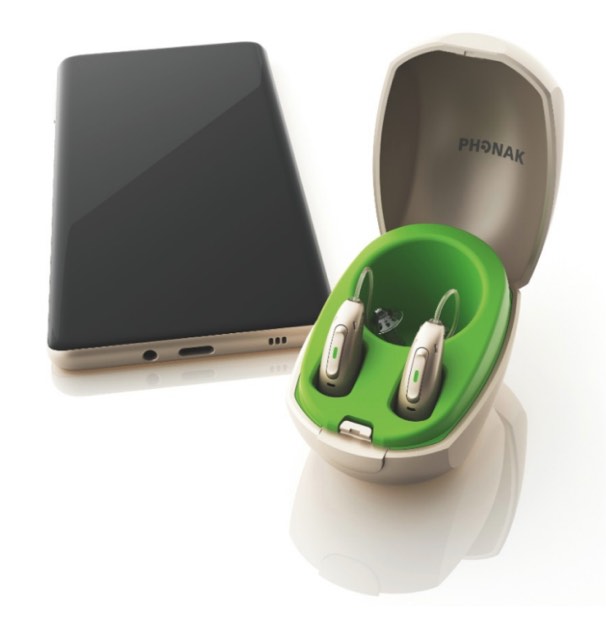
Phonak Hearing Aids
Phonak sells hearing aids for any level of hearing loss, including profound loss. The product line is designed for comfort and ease of use. Most Phonak hearing aids are rechargeable, though its battery-powered options are more affordable.
- Cost per pair: $2,100 – $7,000+
- Type: CIC, RIC, BTE
- OTC or Prescription: Prescription
- Technology: Rechargeable; Bluetooth, tinnitus masking, telecoil, directional microphones, environmental settings, water resistance
- Adjustment: Tapping a button, turning a dial, via the app, in person
- Warranty and trial period: One to three years, though warranties vary by retailer
- Financing: Varies by retailer
Dr. Matyko says Phonak has one of the best reputations among hearing professionals. “It’s usually the most expensive, but people are genuinely happy with the product.” Phonak’s hearing aid prices are set by your local provider. Devices start at $2,100 and cost up to $7,000 for high-end models. Phonak doesn’t distribute directly to customers, but instead through hearing professionals. Retailers like ZipHearing can also locate a local provider for you.
Read our comprehensive Phonak hearing aids review to learn more.
Audien Hearing Review
Great Affordable Options |
Audien Hearing offers affordable over-the-counter hearing aids and hearing amplifiers. The Audien Atom series (in-the-canal) and the Audien BTE (behind-the-ear) are medical-grade hearing aids registered with the FDA. The EV1 and EV3 are not medical-grade hearing aids but rather PSAPs (personal sound amplification products), otherwise known as hearing amplifiers.
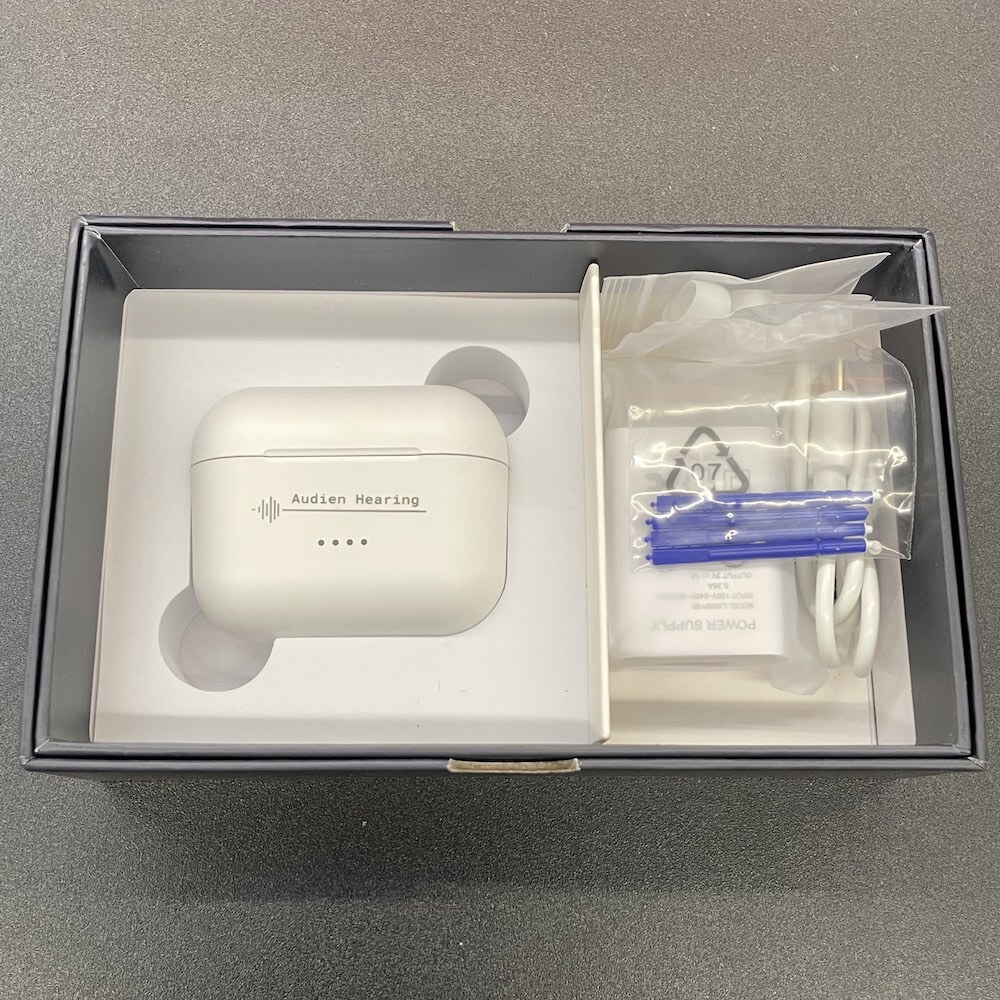
Our editorial team personally tested Audien devices. Aside from their affordable prices, Audien devices stand out because of how easy they are to set up and program. Once you buy a hearing aid or amplifier, it is shipped directly to your door within three to five business days. To program your Audien hearing device, simply charge it, find the correct-sized earbud, and set the device volume to the appropriate level. The rechargeable devices last up to 24 hours.
- Cost per pair: $99 – $489
- Type: ITC
- OTC or Prescription: Over-the-counter
- Technology: Rechargeable batteries, wireless charging, noise/feedback cancellation
- Adjustment: Tapping on the ear, twisting the dial with a screwdriver (included)
- Warranty and trial period: 45-day trial period; No warranty
- Financing: None
While Audien’s devices are inexpensive, the company does not offer a warranty for its products. Instead, you have a 45-day trial period to decide if their hearing devices are right for you.
Learn more about our experience testing an Audien hearing device in our full Audien Hearing review.
ELEHEAR Review
Great battery life |
ELEHEAR is a newcomer to the OTC hearing aid market. In 2023, the company launched two behind-the-ear devices available for purchase on its website. The Alpha and the Alpha Pro are rechargeable and compatible with Bluetooth. They’re also discreet and comfortable enough to wear all day.
The Retirement Living review team wore the ELEHEAR Alpha Pro for two weeks. Its standout features include an extra-long battery life and the ability to make quick and easy adjustments in seconds via the free app.
- Cost per pair: $399 – $499
- Type: BTE
- Battery: Rechargable
- Technology: Wireless charging, Bluetooth, noise/feedback cancellation, 4 environmental settings
- Adjustment: In the app; tapping on the ear
- Warranty and trial period: 45-day trial period; 1-year warranty
- Financing: Yes, via Klarna
The Alpha model offers feedback control and noise reduction that magnifies sounds by 37 decibels. The Alpha Pro comes with several additional features, such as the ability to adjust your hearing aids via the app, Bluetooth streaming, and AI noise reduction.
ELEHEAR says that the Alpha Pro rechargeable battery lasts 20 hours, but our reviews team found that it lasted much longer—an estimated 30+ hours.
Learn more about our experience using ELEHEAR OTC hearing aids in our full ELEHEAR review.
Yes Hearing Review
Great In-Home Care |
Yes Hearing sells hearing aids from the biggest brands, including Oticon, Phonak, ReSound, Signia, Unitron, and Starkey, for 40% less than retail (no Widex). Yes Hearing operates a virtual business model, which helps the company cut costs and offer more affordable devices.
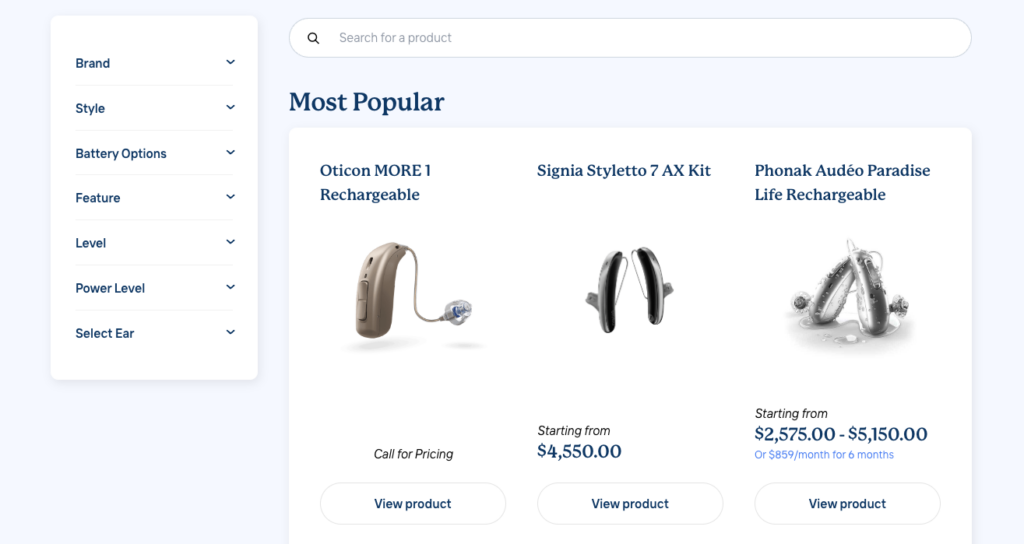
The latest hearing aids like the BTE Starkey Evolv AI or the RIC Resound ONE 9 usually cost between $5,500 and $7,000 if you buy them from traditional retailers. Yes Hearing sells these models for around $4,500.
All devices come with a 45-day money-back guarantee and a warranty. More importantly, each customer gets access to in-home audiology care. Their hearing specialists—many of whom are licensed audiologists—will deliver your new devices to your home and help you test, fit, and program them. If ongoing care is needed, you can purchase a care plan that offers remote or in-person adjustments and more.
To learn more, read our comprehensive Yes Hearing review.
Oticon Review
Innovative Technology |
Oticon’s 11 different technology-backed hearing aid devices are designed for individuals with mild to profound hearing loss, including the Oticon CROS for one-sided deafness. The Oticon Own features the most advanced technology Oticon has to offer, like a Deep Neural Network (DNN). This smart machine uses 12 million real-life sounds to clarify sounds and improve understanding in different environments.
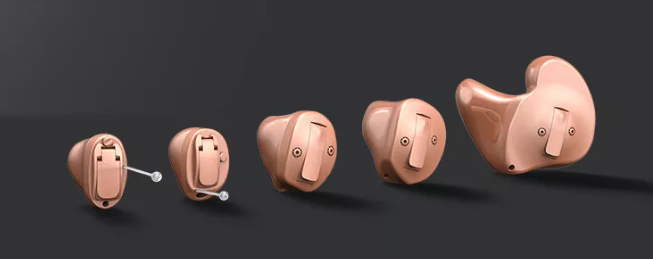
- Cost per pair: $3,000 – $8,000
- Type: ITC, ITE, CIC, IIC
- OTC or Prescription: Prescription
- Technology: Rechargeable batteries, advanced speech processing, Bluetooth, noise/feedback cancellation, tinnitus support
- Adjustment: Tapping a button, turning a dial, via the app, in person
- Warranty and trial period: One-year warranty; Trial period varies by retailer
- Financing: Varies by retailer
With the Oticon ON App, you can check the battery level, switch programs, and access user instructions from your smartphone. The app also features HearingFitness, which allows you to set listening goals (i.e., how many hours you want to wear your device per day) and get tips on how to hear better.
Oticon doesn’t publish hearing aid prices online. However, we found a range from $3,000 to $8,000 per pair based on consumer data.
To learn more about Oticon, read our comprehensive Oticon Hearing Aid review.
Starkey Hearing Aids Review
Great Variety |
Starkey Hearing Aids is an American-owned and -operated hearing aid manufacturer with headquarters in Minnesota. The company’s four hearing aid models are available in 11 styles. Starkey is one of the world’s largest hearing aid manufacturers. Dr. Matyko says Starkey’s customer service stands out above all for being responsive and accommodating. She also recommends Starkey most often for people in need of custom hearing aids.
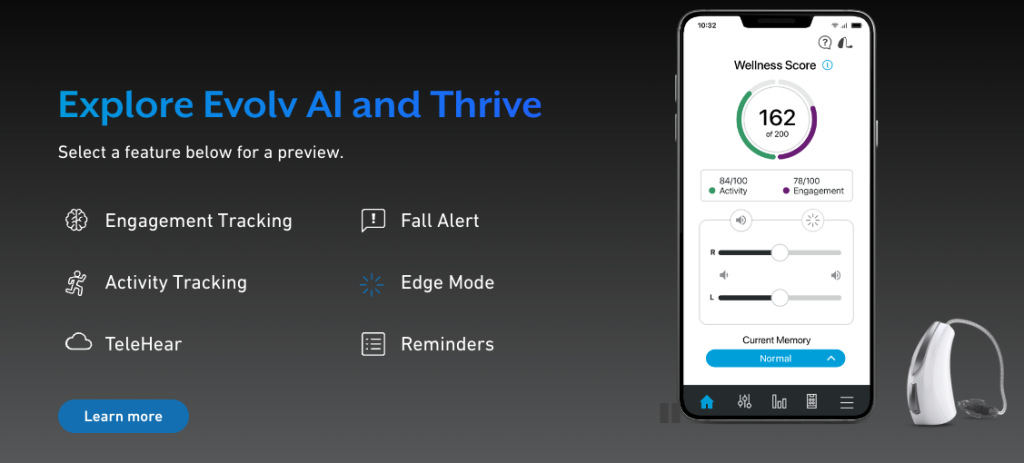
Starkey smartphone apps control and extend the functionality of your hearing aids. Thrive Hearing Control is a fitness app with reporting from hearing aids as they monitor your body and brain health. Thrive Care allows you to live independently by sharing fitness information and fall detection warnings with your family.
- Cost per pair: $2,365 – $5,945
- Type: ITC, ITE, CIC, IIC, BTE
- OTC or Prescription: Prescription
- Technology: Rechargeable batteries, advanced speech processing, Bluetooth, noise/feedback cancellation, tinnitus support
- Adjustment: Tapping a button, via the app, in person
- Warranty and trial period: Varies by retailer
- Financing: Varies by retailer
Starkey hearing aids accommodate different lifestyles, levels of hearing loss and budgets. With Starkey, you can find a hearing aid that meets your needs, even if you prefer fewer bells and whistles.
To learn more, read our full Starkey hearing aids review.
Additional Hearing Aid Companies
You’ll likely find the hearing aid you need from one of the companies on our best hearing aids list, but we wanted to share a few others for your consideration.
Costco offers five brands of hearing aids in many of its wholesale stores. Hearing aids from Costco are well-priced, thanks to the company’s bulk buying power. Read our comprehensive Costco hearing aids review.
Beltone is one of the most advanced hearing aid providers, with more than 1,500 locations across the country. Read our comprehensive Beltone hearing aids review to learn more about their services and technology.
Miracle-Ear has been selling hearing aids for over 70 years. The company offers several styles across four models, including a budget-level hearing aid. Read our Miracle-Ear review for more information.
ListenClear understands hearing loss is a unique experience for everyone, and differing lifestyles require a choice of hearing aids. Read our comprehensive ListenClear Hearing Aids review to learn more.
Hearing amplifiers from BeHear offer customers with mild hearing loss an affordable prescription-free solution. Read our comprehensive BeHear review to learn more.
Our Research Methodology
Our review team personally tested hearing aids to create the most well-rounded review of hearing aid brands. A Retirement Living review team member, who has been diagnosed with mild hearing loss and is a long-time wearer of hearing aids, wore hearing aids from several brands for two weeks each.
We also consulted with four audiologists to determine the most important factors for consumers to consider when buying hearing aids. Based on their professional feedback, we evaluated each brand for fit, comfort, price, technology, and support available.
Lastly, we scored the following data points to give you a well-rounded review of each provider:
- Status with the FDA, company experience, and other credentials
- Costs, both upfront and ongoing
- Range of hearing loss the devices support
- Return policies, trial periods, and warranty options
- Customer service and device support availability
- Online buying experience for OTC devices
- Types of hearing aids available
- Ease of use
- Features and technology, such as Bluetooth connectivity and rechargeable batteries
- Look and design of the device
- Online hearing tests available
Basically, we followed our own buying tips to uncover the best providers. Companies that obscured their prices, lacked customer support, and/or had limited options to buy or try hearing aids were eliminated. The result of our analysis is the hearing aid companies for you, a friend, or a family member to consider.
Tips for Choosing the Right Hearing Aid Product
- Select the hearing aid product that treats your specific type of hearing loss. The CDC outlines four degrees of hearing loss based on your ability to hear certain levels of sound and understand them.
- Understand the difference between over-the-counter hearing aids and prescription hearing aids. For example, you’ll need to complete a hearing test to buy a prescription hearing aid, and some OTC brands don’t treat profound hearing loss or one-sided deafness.
- Confirm that the manufacturer and specific hearing aid model is registered with the FDA. Now that the FDA approved the sale of over-the-counter hearing aids, it’s worth chatting with your doctor for recommendations from reputable brands and dealers.
What to Consider Before Choosing a Hearing Aid
When looking for a hearing aid, you can ensure a comfortable, well-fitting hearing aid by choosing a product that treats your type/level of hearing loss, lifestyle, and budget.
1. Your Lifestyle
A great-fitting hearing aid hinges on buying a product with features that fit your lifestyle. (More on key hearing aid features below.) Do you work? Socialize in large crowds? Frequent public places like restaurants and stores? Features such as directional microphones and Bluetooth connectivity are important for active lifestyles.
The best hearing aids according to your lifestyle:
- For TV watchers and small-group conversations: OTC hearing aids with Bluetooth connectivity and directional microphones.
- For outdoor activists: CIC models with feedback suppression that reduces wind noise.
- For working professionals: Devices with directional hearing microphones that process sound at various angles (not just the front).
- For glasses wearers: ITEs, ITCs, and CICs that fully sit in the ear canal and do not interfere with glasses.
- For those with severe hearing loss: Prescription hearing aids like ReSound or Phonak with advanced sound processing.
2. Type of Hearing Loss
There are several types of hearing loss, ranging in frequencies from high to low. Taking a hearing test before you buy can help determine the specific degree of hearing loss and identify the best hearing aid for you. For example, over-the-counter aids are best suited for those with mild to moderate loss.
Some hearing aid providers offer online hearing tests, but you’ll get a more accurate reading during an in-person test conducted by a hearing professional. OTC hearing aid companies like Jabra Enhance and Audicus have an audiology team that interprets audiograms and programs hearing aids.
For OTC hearing aids especially, do your due diligence on the professionals offering device recommendations, says Dr. Michelle Matyko, an audiologist and co-owner of Roosevelt Field Hearing in Garden City, New York.
“[Some] OTCs are sold by professionals with little to no audiology experience, and they may not know how to read an audiogram or what it says,” explains Dr. Matyko. “I suggest customers ask their hearing care professional to explain their results and let them know if they are a candidate for OTCs.”
3. Ongoing Maintenance and Warranties
Most high-quality hearing aids last for three to seven years. But all devices, regardless of the technology, require ongoing maintenance. Opting for a device that comes with a warranty is often a great way to ensure loss-and-damage protection.
You should also choose a hearing professional or online hearing aid company that offers support programs should you need to repair, replace, or reprogram devices.
Many of our top hearing aid companies offer unparalleled support via phone, online, or in-office locations. Yes Hearing assigns each customer a care specialist who delivers your hearing aids and helps you set up, program, and adjust your aids in person. ZipHearing specialists connect customers to local dealers who offer lifetime customer support.
4. Technology
As you research hearing aid technology, you’ll notice the devices are much smaller now compared to decades past. The OTC Atom Pro 2.0 we tested was the size of a dime and barely noticeable in our ears. Even some behind-the-ear models are small enough to be discreet. (Our team liked the BTE Starkey Evolv AI for its stylish design.)
In addition, rechargeable hearing aids are common and do away with changing batteries, which make them a good choice if you don’t see well or have trouble handling small parts.
- Artificial Intelligence (AI) trains hearing aids to differentiate between sounds to amplify or de-emphasize. The technology cuts through the cluttered noise in most environments. AI utilizes machine learning and Deep Neural Networks to simulate the brain’s neural connections, used in the Oticon Own hearing aid.
- Feedback suppression, telecoils, and preprogrammed settings are ideal for hearing well in a crowded or large space and adjusting as needed.
- Bluetooth wireless technology connects hearing aids to smartphones, tablets and other devices for streaming sound and other benefits.
- Directional microphones, infrared and FM systems filter out background noise and automatically change settings based on your surroundings.
5. Trial Periods and Return Policies
The high cost of hearing aids may have you looking for the most affordable product, but it’s important to choose a hearing aid that you’ll actually wear—this requires testing and experimenting with different products. Keep in mind that some of the less expensive devices don’t have the detailed programming options necessary for many types of hearing loss.
You may try several hearing aid models before finding the right one. We recommend prioritizing hearing aid companies that offer trial periods and easy return policies. Many of the OTC hearing aid companies mentioned above offer a 45-day trial period, and several other brands have generous return and refund policies.
Top Hearing Aids of 2024
- Great Virtual Support – Jabra Enhance Hearing Aids
- Innovative Products – Eargo
- Great Subscription Plan – Audicus
- Great Technology – Lexie Hearing
- Great Value Hearing Aid – MDHearing
- Great Service and Value – Embrace Hearing
- Great Selection – Hear.com
- Great Online Store – ZipHearing
- Great Natural Sound – Widex
- Great Mobile Apps – Signia Hearing Aids
- Broad Product Line – Phonak Hearing Aids
- Great Affordable Option – Audien Hearing
- Great Battery Life – ELEHEAR
- Innovative Products – Oticon
- Great In-Home Care – Yes Hearing
Types of Hearing Aids
Hearing devices are categorized into two types: In-The-Ear (ITE) and Behind-The-Ear (BTE). ITE aids are sometimes referred to as “invisible hearing aids” because they fit snuggly in your ear canal based on an impression of your ear. BTE aids sit beside or on top of your outer ear with tubes that transfer sound into your canal via a custom-fit ear mold.
Each of these two styles has different combinations and features. While hearing aid manufacturers are trending toward smaller devices, your degree of hearing loss or lifestyle may rule out the tiniest styles.
From Our Expert
“BTEs are used with children and seniors because they are compatible with accessories used at home and in the classroom. BTEs are also more powerful, and the molds can be easily changed as children outgrow the current ones.
Middle-ear issues or those with a hole in the eardrum are better suited for an aid that does NOT sit directly in the ear canal. Plus, BTE hearing aids function better with a cleanable mold than an actual aid, which is convenient if you have heavy wax buildup.”
The chart below explains the various types of hearing aids—but a hearing specialist or audiologist might recommend a style based on your level of hearing loss, lifestyle, and budget.
| Hearing Aid Style | Fit and Use |
| Behind-The-Ear (BTE) | Speaker behind the ear Largest style Mild to severe hearing loss |
| Receiver-In-Canal (RIC) | Speaker in the canal Similar to BTEs, with better amplification Mild to moderate hearing loss |
| In-The-Ear (ITE) | Speaker in the outer ear Biggest, custom-fit option Mild to severe hearing loss |
| In-The-Canal (ITC) | Components in the lower, outer ear and in canal Custom-fit, smaller ITE model Mild to moderate hearing loss |
| Completely-In-Canal (CIC) | Speaker in the canal Small, custom fit Mild to moderate hearing loss |
| Invisible (IIC) | Speaker in the canal Smallest and most discreet model Mild to moderate hearing loss |
OTC Hearing Aids vs. Prescription Hearing Aids
The Over-the-Counter Hearing Aid Act of 2017 was the first piece of legislation allowing consumers to buy hearing aids over-the-counter (OTC)—just like you would cold medicine. In August 2022, the FDA authorized the purchase of certain hearing aids directly from pharmacies, stores, and online retailers, with no doctor visit or prescription required. According to the rule, OTC hearing aids are “intended to address perceived mild to moderate hearing loss in adults age 18 or older.”
The FDA regulates both OTC and prescription hearing aids as medical devices. You can purchase OTC hearing aids directly from the companies that make them, but you must buy prescription hearing aids from a clinic after taking a hearing test.
Prescription hearing aids are usually more expensive because they include fittings and ongoing adjustments as part of the package. OTC aids are more affordable (prices are expected to drop even further in 2024), but they often lack the sweeping customer support you might crave as you explore hearing aids. Companies like Eargo and Jabra Enhance offer remote customer support, while Yes Hearing offers in-person aftercare with every purchase.
Again, if you are able, consider more than just budget when choosing a hearing aid. While prescription hearing aids are often more straightforward than newer, more modern OTC aids, it doesn’t mean they’re not worth the investment.
“OTC hearing aids are definitely for a specific patient: Tech savvy, independent, and they present with mild to moderate hearing loss,” says Dr. Matyko. “Most of our patients need hands-on training, care, programming, maintenance, and all-around assistance with hearing aids.”
Read more: To learn more about our experience testing OTC hearing aids, review our resource on the best OTC hearing aids.
Hearing Aids vs. Hearing Amplifiers
Hearing aids and hearing amplifiers both amplify sound and audio, but amplifiers make all sounds louder whereas hearing aids provide custom amplification according to your needs that make sounds easier to hear. The FDA does not regulate amplifiers, so you can buy one without a prescription. However, those with mild-to-severe hearing loss may find hearing aids more beneficial.
There are three essential parts to all hearing aids:
- Microphone: Receives sounds in your environment, then converts the sounds into a digital signal.
- Amplifier: Selectively increases sounds digitally.
- Speaker or receiver: Produces sound amplified at the proper level in your ear.
Amplifiers are also less expensive than aids—often starting at around $50. Before purchasing an amplifier, Dr. Matyko suggests discussing your degree of hearing loss with your audiologist to understand what you are a candidate for.
Read more: Hearing Aids vs. Hearing Amplifiers
How Much Do Hearing Aids Cost?
Based on our conversations with manufacturers and providers, starting prices for a pair of hearing aids in 2024 range from about $100 to $8,000 or more. The FDA’s August 2022 ruling is expected to lower the cost of OTC hearing aids even further as companies compete to increase access to affordable devices.
Total hearing aid prices generally include service bundles that include benefits such as an initial consultation and evaluation, hearing tests, custom molds and fit adjustments, and ongoing support for reprogramming as needed.
Keep in mind that the more affordable hearing aids on the market don’t necessarily mean you’re getting a less effective aid, but rather fewer additional and advanced features.
Does Medicare or Medicaid Cover Hearing Aids?
Medicare does not cover hearing aids, but Medicaid may be able to help seniors in certain states. Currently, 28 states offer some type of coverage for those over age 21: Alaska, California, Connecticut, Florida, Hawaii, Illinois, Indiana, Iowa, Kansas, Michigan, Minnesota, Missouri, Montana, Nebraska, Nevada, New Hampshire, New Jersey, New Mexico, New York, North Dakota, Ohio, Oregon, Rhode Island, South Dakota, Texas, Vermont, Wisconsin, and Wyoming.
Contact your state agency to find out if you’re eligible. Also, most states’ Department of Health and Human Services offices offer financial assistance programs to help cover the cost of hearing aids.
Read more: How to Pay for Hearing Aids
Hearing Aid Features to Consider
- Telecoil (t-coil) technology that improves hearing in public places and on telephones. CIC and IIC devices often lack telecoil technology, due to their smaller size.
- Directional microphones that make conversing with smaller crowds in noisy environments easier.
- Rechargeable batteries that eliminate the need to buy new replacement batteries. Rechargeable batteries can last up to five years, whereas disposable batteries need replacing every couple of weeks. IICs and a lot of CICs require a battery and cannot be rechargeable.
- Feedback suppression technology, which reduces acoustic feedback (often experienced with phones). This may also include impulse noise and wind reduction technologies, which can be good for listeners who have good hearing in lower frequencies.
- Bluetooth compatibility and wireless technology that allows you to stream calls and audio from your phone to your hearing aid. You can also adjust your sound settings from your phone.
- Tinnitus masking to minimize ringing or buzzing sounds that people with tinnitus often hear.
Some devices also allow you to make adjustments with remote controls or switch to various preprogrammed settings to hear in different environments. If you aren’t sure what hearing aid features are best for you, consult an audiologist or hearing aid specialist who can provide guidance.
How to Buy a Hearing Aid Online
The ability to buy online hearing aids eliminates some of the barriers that can prevent people from seeking care for their hearing loss. The process for buying most OTC hearing aids is similar to online shopping with any other retailer. First, you’ll browse various models and devices. After exploring device options, you’ll “checkout” and enter your billing and shipping information (some companies offer financing).
Some companies may require you to upload the results of a hearing test from a third party if they don’t offer one themselves. We recommend getting a hearing aid test online or in person before buying a device to ensure you pick one that meets your needs.
Our Experience Taking Online Hearing Tests
Many brands offer online hearing screenings to help customers understand whether hearing loss is present. The Retirement Living editorial team took 11 online hearing assessments and evaluated the value of the experience (i.e., whether you could use these results to make a hearing aid purchase, program your devices, or consult an audiologist). These tests offered by the brands mentioned above are free, but each company offers a slightly different testing model with varying results.
Here are a few key takeaways from our experience with online hearing tests:
- The equipment you use makes a difference. Every test recommended we use headphones or earbuds to help ensure more accurate results, though GoHearing and Eargo had options for taking the test using computer speakers. Every audiologist we spoke to cautioned that online screenings cannot account for environmental noise or the type of earpieces you are wearing while taking the test. After taking the tests with and without headphones, we can confirm results do fluctuate according to how well you follow the test recommendations. (See the pictures below for comparison.)
- Online tests provide high-level results compared to in-person evaluations. While most online hearing tests assess for tone frequencies, the screenings are not diagnostic—they won’t help determine the type of hearing loss (conductive, sensorineural, or mixed hearing loss). Whenever possible, use these tests as a starting point for further evaluation and recommendations.
- Online tests are surprisingly high-tech, making it easy for users to pair their headphones to their devices, calibrate sound, and deliver reasonably accurate results. Two brands, Eargo and Soundly went so far as to incorporate a hand-rubbing technique in front of our faces to more accurately calibrate sound.
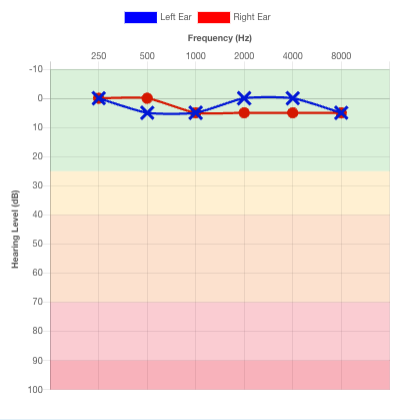
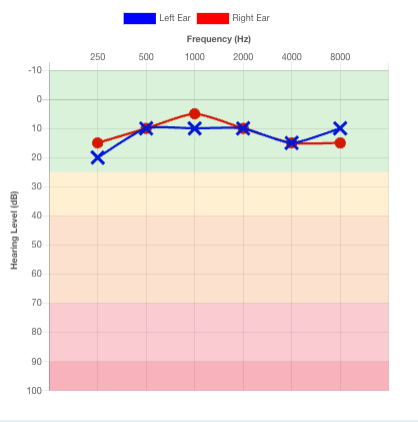
Frequently Asked Questions about Hearing Aids
How do I know if I need hearing aids?
Most run-of-the-mill hearing loss is about clarity, not volume. That means most people with hearing loss can hear the voices, they just aren’t sure what they are saying. If you think you are experiencing hearing loss, you’ll need to see an audiologist or an otolaryngologist (ear, nose and throat doctor) for a full and proper diagnosis.
What are the best hearing aids for glasses wearers?
In-the-ear (ITE), in-the-canal (ITC) and completely-in-canal (CIC) hearing aids are better for glasses wearers with mild to moderate hearing loss because they fully fit into the ear canal and do not interfere with glasses.
Where can I buy hearing aids?
Manufacturers with FDA-registered devices can partner with retailers to sell over-the-counter hearing aids in places like Best Buy, Walmart, Costco, and Walgreens. If you have more severe hearing loss and have a prescription, you can buy hearing aids, such as Oticon, Starkey, and ReSound, from an independent party online, or a local hearing aid professional who is authorized to sell the product.
Why are hearing aids so expensive?
The research and development costs for manufacturing hearing aids can be high—especially for companies committed to product innovation. There are also many consumer safety regulations and insurance challenges impacting healthcare product companies and healthcare service providers.
Beyond that, many hearing aid companies offer ongoing services and support, and bundle these features into the final price. Know that the price reflected is often only partially about the device itself and more about the supportive/maintenance services included with the purchase.
How long do hearing aids last?
Hearing aids can last anywhere from three to seven years or longer, depending on how the device was built, how much you wear it, and how well you maintain it.
Which hearing aid is best for me?
Finding the best hearing aid to fit your needs often requires the help of an expert who can conduct a hearing test and ask questions related to your degree of hearing loss. You also need to consider your lifestyle habits, occupation, environments you frequent, and the additional advanced features you want in your hearing aid.
An audiologist can help you identify a list of hearing aids that match your degree of hearing loss and your budget. And don’t forget about the fit and feel of a hearing aid. Most experts say the best hearing aid is one you will wear regularly.
What is the easiest hearing to use?
The easiest hearing aid to use depends on your degree of hearing loss, communication needs, lifestyle, dexterity, vision, and comfort with technology among other things. Smaller instruments are often easier to conceal, but tougher to handle for those with limited dexterity. It’s also harder to squeeze more features into a smaller device. Some may prefer the ease of rechargeable batteries, whereas people with active lifestyles may like a hearing aid that comes with app connectivity and digital noise reduction.
Related Hearing Aid Resources
Readers of this hearing aid guide also found these related articles helpful:
- Best OTC Hearing Aids
- How to Pay for Hearing Aids
- Hearing Aid Types Explained
- Hearing Aid Technology: The Latest Innovations
- Best Hearing Amplifiers
- Eargo vs. Miracle Ear
- The Loudest Cities in America
Local Hearing Aid Companies Near Me
- Atlanta, GA
- Austin, TX
- Boston, MA
- Charlotte, NC
- Chicago, IL
- Cleveland, OH
- Dallas, TX
- Denver, CO
- Detroit, MI
- Fayetteville, AR
- Fort Worth, TX
- Houston, TX
- Las Vegas, NV
- Los Angeles, CA
- Memphis, TN
- Miami, FL
- Minneapolis, MN
- New York, NY
- Orlando, FL
- Philadelphia, PA
- Phoenix, AZ
- Portland, OR
- Raleigh, NC
- San Diego, CA
- San Francisco, CA
- San Jose, CA
- Seattle, WA
- St. Louis, MO
- Tampa, FL
- Tulsa, OK
- Washington DC
Concluding Thoughts on Hearing Aids
Bottom Line: If you have been told you need hearing aids, you have options.
We narrowed your choices for purchasing hearing aids but still gave you plenty of options to choose from. Always consider your lifestyle and cost when you shop for hearing aids. You may have to spend more to have your hearing effectively corrected, so don’t sacrifice quality to save money. However, low-cost hearing aids with excellent technology are available.
